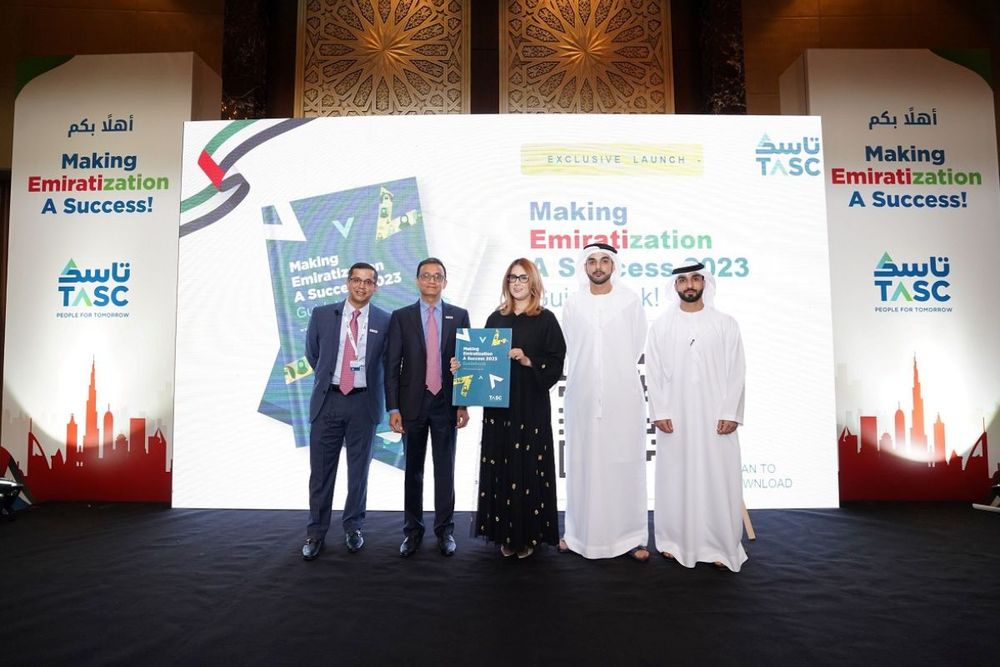Tasc Outsourcing Conducts the Largest Emirati Candidate Survey, Unveiling Job Market Insights, and helps organizations identify challenges and opportunities in Emiratization.
Key Highlights:
- When asked about their career plans for 2023, 66% of Emirati respondents showed interest in finding a role that aligns with their sense of purpose, while 18% of the respondents plan to stay with their current employer
- More than 50% of Emirati candidates surveyed are willing to be flexible when it comes to relocating to a different city in the country for work
- 63.91% of Emirati professionals expressed dissatisfaction with their current salaries, while only 36.09% were content
- Remote/ hybrid work options ranked the lowest as an influencing factor to only 37% of respondents
In a first-of-its-kind initiative to help organizations identify challenges and opportunities in Emiratization, TASC Outsourcing, the region’s leading recruitment agency, surveyed in January 2023 to support the UAE government in enabling Emiratization. The survey canvassed a strength of 500 respondents, officially making this the largest Emirati candidate survey to date. The study aimed to understand the representation of Emirati citizens in the country’s workforce. Emiratization as a national policy has been evolving each year. It now requires private sector companies with 50 skilled employees and upwards to have 4% Emiratis in their workforce by the end of 2023.
The survey insights were launched as a guidebook during their event, ‘Making Emiratisation A Success’, followed by a keynote and panel with the government and industry experts. The TASC report reveals insights to enhance competitive knowledge to accelerate Emiratization, and given that the Emiratization rate for high-skilled jobs will gradually increase to 10% by 2026, this report serves as a foundation to build up a skilled Emirati workforce for employment needs.
The preferred outsourcing, recruitment, and HR specialists for many organizations in the UAE, TASC’s efforts have been channelized towards supporting not just the individual Emiratization goals of corporates but also helping fulfill the government’s vision for Emiratization.
Along with TASC Outsourcing, the panel was headed by Mr. Mohammad Abdullatif (Director of Coordination & Partnerships, Ministry of HR & Emiratization), Ms. Gabriella Planojevic (Group Head of Talent Management, Al Futtaim), Mr. Ibrahim Al Sayegh (Group Head of Emiratization Strategy and Planning, Al Futtaim), Ms. Susana Correia (Head, MENA Staffing LinkedIn) and Mr. Talib Hashim (Emiratization Consultant and Headhunter TBH). Ms. Yasmeen Al-Marzooqi (Director Talent Acquisition, Etisalat by e&) graced the event as a keynote speaker and shared their compelling success story of Emiratization across e& – they achieved 52% Emiratization across their organization in 2022!
Key Survey Findings:
The report highlighted some significant initiatives undertaken by the government to promote Emirati employment, like the Emirati Salary Support Scheme, a dedicated Recruitment Portal, Career Guide, Apprenticeship, Healthcare, and Pension schemes. While the report mentions IT, Data Engineering, administration, and call centres as top employment opportunities for Emiratis, internships will also provide valuable work experience and develop the skills to secure long-term employment.
According to the survey results, there has been a growing trend towards work-life balance and job fulfillment among Emirati job seekers in the UAE. At the same time, 8% of respondents aim to start their own business, showcasing interest in entrepreneurship, aligning with the government’s ‘Projects of the 50’ initiative.
41% of Emiratis are uncertain about changing jobs, indicating satisfaction but openness to new opportunities.
A majority of Emiratis (77%) consider job sites as a popular medium to seek jobs, followed by company websites (13%) and recruitment agencies and references (5%). This also highlights the need for employers to promote their openings through multiple job portals.
The survey also highlighted that apart from salary packages, job benefits (73.6%), job security (66.7%), and career development (62.9%) are the top 3 influential factors for Emirati job seekers considering a new role.
The three most important benefits, according to the surveyed candidates, include support in upskilling (34.34%), job location and working hours (32.53%), and flexible working options (18.93%).
Insights from the Panel Discussion
Speaking on TASC’s efforts to enable Emiratization in the UAE, Mr. Mahesh Shahdadpuri (Founder and CEO of TASC Outsourcing) said,
“Closing out 2022, 65% of businesses in the UAE celebrated their success in meeting their Emiratization targets. Companies are looking towards 2023 with renewed enthusiasm as over 25% have identified 11-50 job vacancies suited specifically for Emiratis spread throughout HR & Administrative roles, Sales and Marketing, Operations, and Customer Service roles. The UAE is one of the Middle East’s largest economies that continues to evolve. As we march towards ‘We the UAE 2031’, Emiratization will be one of the strong pillars supporting this vision and a key performance indicator of its success. This report will be a perfect guide to identify challenges and apply market insights to implement Emiratization in the right spirit and speed.”
In a dynamic landscape where competitive employment is seen juggling between the right candidate and job profiles, this report intends to help the private sector re-strategize to attract and retain local talent.
Sharing her thoughts during the keynote, Ms. Yasmeen Al-Marzooqi (Director Talent Acquisition, Etisalat by e&) said after the event,
“Emiratization has succeeded in bringing about a quantum leap in the business environment. The boost in the employment of Emiratis and the increase in the private sector’s share of the country’s GDP have amalgamated well to provide synergy. Furthermore, initiatives like the Nafis Program are a competitive edge that assures empowered Emirati human resources. That the UAE will spend up to AED 24 billion (USD 6.53 billion) under Nafis to employ 75,000 Emiratis in the private sector between 2021 and 2026 reflects on the commitment and resource allocation to fuel Emiratization.”
Focusing on the candidates’ perspective on Emiratization, Mr. Abdulmuttalib (Talib) Hashim (Emiratization Consultant and Headhunter TBH) said,
“There has been a growing trend towards work-life balance and job fulfillment among Emirati job seekers in the UAE. While 66% of Emirati respondents showed interest in finding a role that aligns with their sense of purpose, 18% plan to stay with their current employer, and another 8% aim to start their own business, displaying a desire for entrepreneurship – in line with the government’s initiative of the ‘Projects of the 50’. The numbers are encouraging since it serves the purpose well and helps plan future strategy and implementation.”
Ms. Susan Correia (Head MENA Staffing – LinkedIn) added,
“LinkedIn, the world’s largest professional network, helps professionals worldwide create their digital professional identity and connect to opportunity. This includes our Emirati members, who can unlock opportunities on LinkedIn through completing and updating their profile pages and highlighting their skills, experience, and achievements.”
Emiratization focus for 2023
The private sector has responded positively to the government’s Emiratization program. The trend to hire UAE Nationals shall continue momentum due to the government's active efforts through new laws, regulations, and initiatives. As much as 65.8% of employers surveyed in larger organizations and MNCs plan to hire at least 10 Emiratis, and 26% plan to hire 11 - 50 Emiratis in 2023. The report also indicates that employers in the region are open to hiring Emirati talent for a wide range of roles, creating a high level of diversity in the types of roles available to Emirati candidates. The private sector has also created special training programs to hire Emirati talent. Employers are now keen on collaborating with credible recruitment consultants with unmatched experience to effectively identify the best available Emirati talent to meet Emiratization targets. The report also highlighted challenges like unrealistic salary expectations, limited expertise, shortage of skills, and lack of understanding of the private sector as hindrances in the path of the Emiratization process.
TASC remains committed to fulfilling Emiratization targets for companies across the UAE. They suggested that private sector employers provide a complete and transparent job description to Emirati candidates and understand the talent profile for better recruitment and retention. Networking is essential when hiring C-suite and senior-level Emirati candidates. Areas of skill shortage are to be dealt with a broader perspective to identify support and growth through training and upskilling program.
‘Making Emiratization A Success 2023’ was TASC’s contribution towards treating Emiratization as not just a mandate but a shared responsibility to empower local talent for the socio-economic growth of the UAE.









